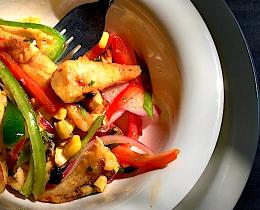Omega: Can you talk about the difference between the terms plant-based vs. vegetarian?
Michael: When you say vegetarian, people think of the classic vegetarianism that was led by Moosewood Restaurant and its cookbooks back in the 1970s. But there is a different feeling when you say something is plant-based or vegetable-centric.
For starters, it allows us to weave in some animal protein, be it eggs, cheese, chicken, turkey, or otherwise. In general, we should be eating less meat and more vegetables—and when we do eat meat it should be of a higher quality. By focusing on the vegetables we get to work with an incredible variety of flavors and textures and look for opportunities to highlight them in different ways. As a chef, the opportunity to work creatively with vegetables and to influence how people think about vegetables is really exciting.
Omega: What's the role of cultural cuisine at Omega?
Michael: There are a lot of great traditions of vegetable-centric or vegetarian cuisine from many different cultures, and to the extent that we can borrow from them, that's great. It's exciting stuff to eat and it's exciting to cook, too. We're aiming to present a broader palette of flavors and at the same time maintain a comfort of tradition for folks who might not have had exposure to wide-ranging cultural cuisine in the past.
Omega: What are some new approaches you're bringing to Omega’s menu?
Michael: We are crafting menus and using techniques that allow us to be as sensitive as possible to the myriad concerns that Omega's participants have. We're looking to provide balance and to make every guest feel that they're not missing anything.
It's such a diverse population that visits Omega, with people who are longtime vegetarians and vegans and people who have food allergies, food issues, and concerns. We're trying to be cognizant of that and to cook in a way that makes it accessible for every individual that comes to campus.
We are looking at what's available specifically from the Hudson Valley, which, in the height of summer, is going to be almost everything. It’s always an exciting challenge to be as local as possible, as the season permits. As we move forward, we'll be able to use more preservation and season-expanding techniques, which requires a forward-thinking commitment to buying that product, processing that product, and having a plan for how to use it next year.



